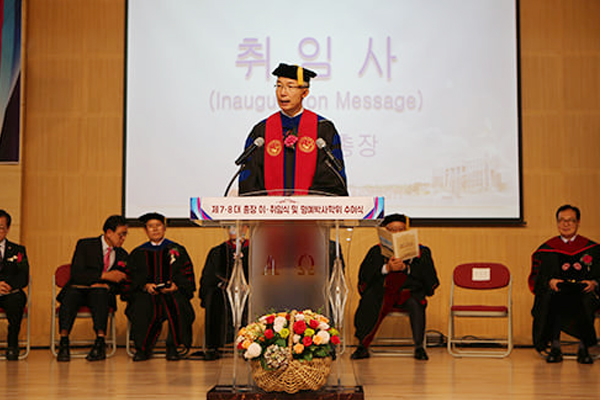Ten years ago, December 12, 2009, to be exact, I returned to the campus of Mount Vernon Nazarene University, Mount Vernon, Ohio, to deliver the winter commencement address. Please find below a summary of the thoughts I shared with the graduates, their family, and friends. You may click here to read the full address, “Creating Space and Making Room.”
Following a sabbatical leave at Mount Vernon Nazarene University in 1999 when I spent a semester at Yale University Divinity School working through the library of the late Roman Catholic theologian, Henri Nouwen, I gave more intentional thought to the relationship of spiritual hospitality to Christian leadership. In the workforce where our vocation leads us, in the business offices, the public-school classrooms, the hospital corridors, the university offices, in the local churches and in our homes.
How do we “create space and make room,” on the job or in our home, especially when we experience conflict and even collision between good and godly people over our vision, values, policies, and programs?
This practice of hospitality was a way of life fundamental to Christian identity for seventeen hundred years of the Christian church. Christine Pohl convincingly documents this practice in her book, Making Room: Recovering Hospitality in Christian Tradition. In this commencement service, I want to challenge you to embrace in your leadership responsibilities the rich concept of spiritual hospitality. It has the potential of transforming relationships with those individuals with whom you live and work.
Biblically and theologically, the term “hospitality” is not limited to receiving a stranger into our homes – although it surely includes this dimension. Fundamentally, it is a core attitude toward others, which can be expressed by a great variety of behaviors. Hospitality, biblically understood, challenges us to relate to others as if we were relating to Christ Himself.
“Hospitality” means primarily the “creation of free space” – making room, to use Pohl’s words, in the midst of differences of thought or behaviors that may exist. With this perspective, the attitude of hospitality helps us “to make room or create space” for those with whom we live and work. The strange and the stranger can enter and become a friend. It is being to others with whom you live and work, a “living witness of the risen Christ.”
The gift of Christian hospitality is the opportunity we provide for the colleague, coworker, guest, stranger, family member or friend to find his or her own way. It enables us to consider an alternative way of thinking from those who may be very different from us. This gift to others invites them to contribute insights derived from these unique gifts and abilities, even in the context of differences of thought and behavior. In practicing hospitality and being hospitable, as leaders, we often serve as “angels of God” without even knowing it. It is an art that more Christians need to cultivate.
Fundamentally, the relationship between spiritual hospitality and Christian leadership is much more than being nice, feeding friends or enduring “hard to get along with” co-workers, colleagues, family members or friends. It is a way of life for leaders who are passionately Christian and dictates how we approach those with whom we live, work and serve. For the strange and the strangers, the disenfranchised and lonely, our family members and friends, “creating space and making room” for them is the essence of hospitality, biblically understood.
We experience the “surprises of God” in our lives in the process of enabling others to grow and mature. Through “providing space” and “making room” for others to change, we are given “space” by God to grow and mature in Christlikeness.
Spiritual hospitality is nothing less than the amazing grace of God working in us and through us as Christian leaders! I challenge you to pursue this nearly forgotten practice in the Christian tradition.
I welcome your comments.





